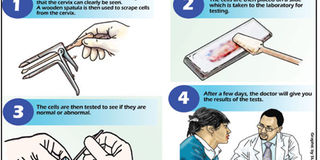Prime
Taking a pap smear test

What you need to know:
FACTS ON THE PAP SMEAR
- The smear test is named after George Papanicolaou – the physician who pioneered the technique. Bleeding after a pap smear test is normal because they are scraping skin off the sensitive cervix.
- You should wear clothes that are easy to take off. Like a skirt with sandals or jeans and flip flops.
— Internet
It is uncomfortable and feel intrusive but this test is one every woman above the age of 21 should take if they want to increase their chances of surviving cervical cancer.
Whenever anyone, especially a woman feels any kind of pain mainly in their lower abdomen, they will immediately go and see a gynaecologist but if there is no pain, they lay back and relax after all any kind of sickness generally comes with symptoms.
Little do they know that diseases like cervical cancer will only show signs when they have reached their worst stage. That is why it’s important for every woman to be tested for cervical cancer whether they feel any kind of pain or not and a pap smear test is one of the ways that can be used to detect this infection.
According to Dr Dan Murokora a gynaecologist and the president of the Association of Gynaecologists in Uganda, a pap smear is a screening test used to detect changes in cells that are lining the cervix.
“In order to determine whether a woman is likely to develop cancer of the cervix or not, a pap smear is taken by swabbing off cells that normally shed off the cervix and these are applied on a glass slate. Then the slate is put in alcohol and then stained with a re-agent that helps a trained health worker to identify the cell changes and determine whether you do or don’t have cervical cancer.”
Dr. Murokora says that cervical cancer cells are normally triggered by infections with the human papilloma virus (a virus that is easily transmitted sexually between individuals) which embeds itself in the nucleus of the cells on the cervix causing them to start growing abnormally.
He explains that the initial infection happens when people get their first sexual contact and normally the body is able to clear this infection. “However, with repeated exposure, the viral infection may persist and it’s this persistence that starts causing the cells to grow in an abnormal way,” explains the gynaecologist.
He therefore advises that because of this, every sexually active woman between the ages of 21 up to the stage of menopause should have the pap smear test at least after three years of their initial sexual encounter. He however says that the best alternative would be to have it every year for three years after which you start spacing the tests at intervals of once every three years.
The doctor explains that the repetition of the test is to ensure that a woman is able to get treatment in time in case abnormal cells are detected. He also adds that in cases where the person’s immunity is low because of infections like diabetes and HIV, that person is advised to have this test every year.
“It’s advisable that this test is taken by a trained health worker, it can either be a gynaecologist or a trained mid wife. It’s recommended that a woman be examined while not in their menstrual periods so that the person doing the test can clearly see the cervix.”
When conducting this test, the doctor says that the health worker will use a small instrument to open up the woman’s private parts so that they can clearly see the cervix. They will then insert either a small and smooth wooden spatula or a Cyto brush into the vagina up to the cervix to scrap some of the cells around it.
“This process takes 15 minutes and is not painful although some people might feel uncomfortable being naked before someone else.” He says that it takes a minimum of three days to get the results after taking the test which might cost Shs30,000 excluding consultation in the private clinics but it can be done for free in public hospitals.
When the results come back, you might be presented with results that show that the cells around your cervix are either normal or abnormal. “Abnormal results mean that the cells around your cervix are undergoing changes that could become cancerous and normal results may signify that there is no abnormality at the moment but it does not signify that you are safe. That is why it is necessary for you to keep on doing the test.”
He says that when abnormal cells are discovered, the health worker will prescribe treatment depending on the level of abnormality of the cells. If it’s mild, they might decide to postpone the follow-up because these normally regress on their own. But if the abnormality is serious, they will put you on pre-cancer treatment.
“In this case, they use pressurised refrigerated gas to create a very low temperature on the Cryo machine. Part of this machine is inserted into the woman’s private parts and is used to blow air of negative 80 degrees on to the cervix.
This destroys the abnormal cells around the cervix and enables it to heal on its own.” The doctor therefore advises that all women between 21 years and the stage of menopause go for this test because it’s readily available in the country in hospitals like KCC Dispensary on Nkrumah Road, Kawempe Health Centre, Mulago Hospital, Nsambya Hospital, Mild May, Mbarara Hospital, Itojo, Bushenyi district, Nakasongola health Centre IV and Mbale Hospital.
“Every woman should have this test. In this way, the number of women dying from cervical cancer will be reduced,” adds the gynaecologist.




